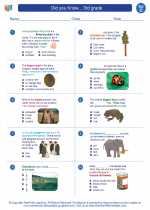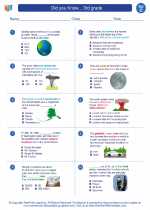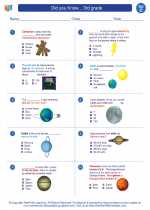Did you Know... 3rd grade -> change
Change in Science
Change is a fundamental concept in science that refers to the process of transformation or alteration in the physical or chemical properties of a substance or system. It is a key aspect of various scientific disciplines, including physics, chemistry, biology, and earth sciences.
Types of Change
In science, changes can be categorized into several types, including:
- Physical Change: This type of change involves alterations in the physical properties of a substance, such as its shape, size, or state of matter, without affecting its chemical composition. Examples include melting, freezing, and dissolving.
- Chemical Change: Chemical changes occur when the chemical composition of a substance is altered, resulting in the formation of new substances with different properties. Common examples of chemical changes include combustion, rusting, and digestion.
- Biological Change: This type of change pertains to transformations that occur in living organisms, such as growth, development, reproduction, and aging.
- Environmental Change: Environmental changes refer to alterations in the natural surroundings, including climate change, erosion, and deforestation.
Causes of Change
Changes in the natural world can be influenced by various factors, including:
- Physical Forces: Forces such as heat, pressure, and gravity can cause physical and mechanical changes in substances and systems.
- Chemical Reactions: Interactions between different substances can lead to chemical changes, resulting in the formation of new compounds.
- Biological Processes: Living organisms undergo numerous changes as a result of biological processes, including growth, metabolism, and reproduction.
- Environmental Factors: Natural events and human activities can bring about changes in the environment, impacting ecosystems and geological formations.
Studying Change
To understand and study change in science, students can engage in various activities and experiments, including:
- Observing and recording physical and chemical changes in everyday materials, such as ice melting, water evaporating, or food cooking.
- Conducting experiments to investigate the effects of different factors, such as temperature, pressure, or concentration, on the rate and extent of chemical reactions.
- Exploring changes in living organisms through activities like observing plant growth, animal behavior, and the life cycles of different organisms.
- Investigating environmental changes by studying phenomena such as erosion, weathering, and the impact of human activities on natural habitats.
◂Science Worksheets and Study Guides Third Grade. Did you Know... 3rd grade
Study Guide Did you Know... 3rd grade
Did you Know... 3rd grade  Worksheet/Answer key
Worksheet/Answer key Did you Know... 3rd grade
Did you Know... 3rd grade  Worksheet/Answer key
Worksheet/Answer key Did you Know... 3rd grade
Did you Know... 3rd grade  Worksheet/Answer key
Worksheet/Answer key Did you Know... 3rd grade
Did you Know... 3rd grade 

 Worksheet/Answer key
Worksheet/Answer key
 Worksheet/Answer key
Worksheet/Answer key
 Worksheet/Answer key
Worksheet/Answer key

The resources above cover the following skills:
LIFE SCIENCE
Unity and Diversity
Construct an argument from evidence to explain the likelihood of an organism’s ability to survive when compared to the resources in a certain habitat (e.g., freshwater organisms survive well, less well, or not at all in saltwater; desert organisms survive well, less well, or not at all in woodlands).
Create models that illustrate how organisms and their habitats make up a system in which the parts depend on each other.